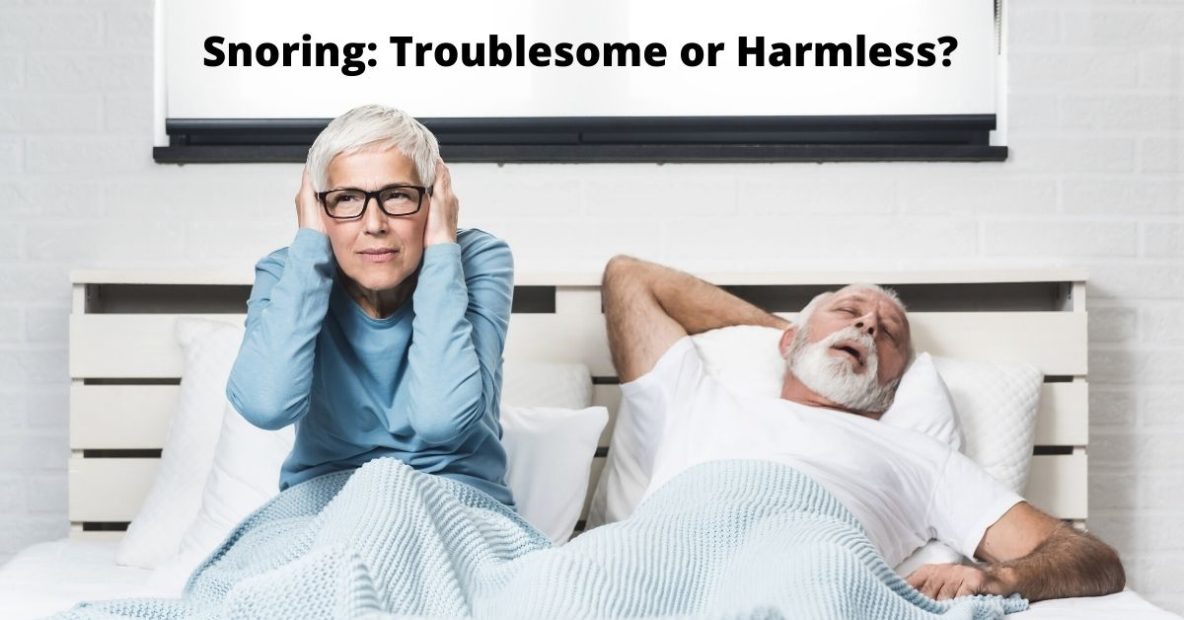Snoring: Troublesome or Harmless

- A Promising Paradigm Shift: New Research Challenges the CPAP-First Approach to OSA Treatment - September 5, 2023
- Understanding Sleep Meditation Techniques - July 30, 2021
- How Online Learning Has Affected Sleep for Students - July 13, 2021
Do you snore in your sleep? Millions of Americans snore several nights a week. Snoring can be very frustrating for your partner, but in many cases your snoring is a simple annoyance. Snoring isn’t always harmless, and troublesome snoring can be a sign of an underlying health issue. If you snore every night, take a few minutes to learn the differences between harmless and troublesome snoring.
All About Snoring
Snoring is actually very common. Up to 36% of adults are habitual snorers who snore at least three nights every week. Men are more likely to snore than women, and can snore throughout the night. Snoring is usually a sign that a person is deeply asleep, but there are really no benefits to snoring. Snoring can be harmless, but it definitely doesn’t provide any advantages.
Snoring is caused by a blockage to your airways, either in your throat or your nose. Snoring usually happens when the muscles in your throat relax while you sleep. This can partially block or narrow your airway. The annoying sound that keeps your partner awake at night happens when the skin in your throat vibrates in the narrow airway.
Is Snoring Harmless?
Snoring can be harmless. When your snores are light and rhythmic, you probably don’t need to worry too much about your snores. Light snores are a sign that your airway is only partially blocked. These snores can be annoying to your partner, but they don’t represent any other health risks.
- These are a few of the factors that increase your chance of snoring:
- Alcohol can make your throat muscles relax, and an evening of drinking can make you snore.
- Being overweight can increase your risk of harmless snoring.
- Age also plays a role in snoring, and your muscles relax more as you age.
- Snoring is also a harmless side effect of a cold, flu, or allergies. These can cause a nose or throat inflammation which narrows your airways.
Harmless snoring can be reduced by sleeping on your side to keep your airway open during the night.
Is Snoring Troublesome?
Snoring can also be a troublesome sign that something’s not right. Be on the lookout for snoring that’s loud and irregular, or snoring that stops and starts abruptly. Troublesome snoring often gets louder and louder, and then suddenly stops. After a few moments of silence, you may gasp or grunt.
If you snore every night, watch for these signs that you may have an underlying health issue:
- Feeling fatigued during the day
- Trouble concentrating or problems with memory
- Headaches in the morning
- Weight gain
- High blood pressure
- Some chest pains during the evening or night
- Waking in the middle of the night feeling like you can’t breathe
If you have any of the above symptoms, your snoring could be a troublesome sign of a sleep disorder, such as obstructive sleep apnea.
Snoring and Sleep Apnea
Have you been snoring several times a week? Ask your partner about your snores. If they characterize your snoring as loud and irregular, you may have obstructive sleep apnea. Sleep apnea is caused by excessive relaxation of the throat muscles. These muscles can completely block your airway during the night, and you wake up gasping for air. This happens many times in the night, and you can’t get a good night’s sleep. Sleep apnea is a serious condition that can affect your energy levels, concentration, and even heart health.
Pay attention to your quality of sleep, or if you’ve been waking up during the night. Ask your partner if they’ve noticed changes in your sleep, or notice that you stop breathing during the night. A person with sleep apnea may not wake up in the night even when breathing stops, so your partner can be the first to notice any issues.
If you snore, visit us for a consultation. We’ll ask you all about your sleep habits to find out what’s causing you to snore. We can also perform a sleep test and monitor your breathing and your snoring during the night. If you have troublesome snoring caused by sleep apnea, we’ll suggest a treatment method that will stop your snoring, and help you get a good night’s sleep every night.
